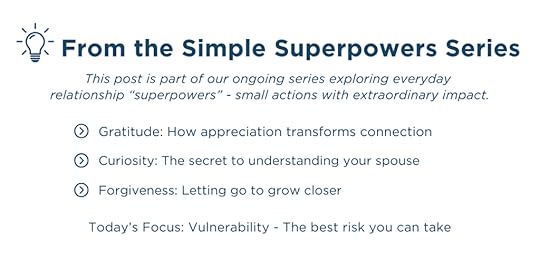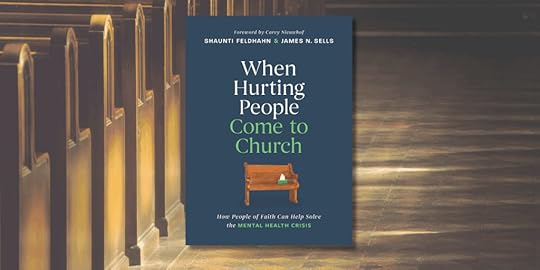Why Vulnerability Is the Best Risk You Can Take (Part 1)

After more than two decades of research, surveys, and interviews with close to 50,000 people, I will go out on a limb and say there is one “relationship superpower” that most people would never see as a superpower: a willingness to be completely vulnerable in our most important relationships. And as you will see from a fascinating research study I’ll outline below, vulnerability is almost a prerequisite for a thriving, close marriage.
Now, some of us will think of course we need to be vulnerable—but don’t realize we are agreeing in theory but aren’t actually vulnerable in practice. Others may think of vulnerability as something optional—it’s like a level of the relationship you unlock when you’re really ready. And there are plenty of people who find the idea of true vulnerability terrifying after experiencing betrayal of trust in childhood, in earlier relationships, or perhaps even in your current marriage relationship.
Regardless of your pattern here’s a truth to settle into: Being willing to let your spouse see all of you is one of the most powerful actions for creating a great marriage. Vulnerability is how ordinary couples build extraordinary trust and intimacy. (Although it is also important to note that rebuilding trust after it has been broken will require a somewhat different process that is largely beyond what we can cover here.)
I feel so strongly about this that I’m not only including vulnerability as an installment in our Simple Superpowers series (which includes other relationship powerhouses of gratitude, curiosity, and forgiveness) but I’m also rolling out vulnerability this month in a three-part blog.
In Part 1, we will look at four truths that make vulnerability a relationship superpower as well as the best risk you can take. In Parts 2 and 3, we will examine six action steps that will help you become vulnerable with the most important person in your life.
 Truth #1: Vulnerability builds deeper connection
Truth #1: Vulnerability builds deeper connectionA few decades ago, a group of researchers put together a series of remarkable experiments that created an entirely new stream of thought among counselors and therapists about the importance of vulnerability in relationships. It is now seen as almost a prerequisite for connection.
One study specifically examined vulnerability between a husband and wife. The study followed couples for six weeks, asking each partner every day whether they had shared something personal and how their spouse responded. The researchers found that on days when a spouse opened up and the other responded with warmth and understanding, both felt more intimate and connected that day. But there was an important additional finding: On days when disclosure didn’t happen, closeness didn’t grow. Intimacy simply stayed flat. And over time, ‘flat’ intimacy ends up feeling like no intimacy at all.
Why do I say that? Well, think about someone you know (maybe yourself!) who has said, “It feels like my spouse and I are just roommates; we don’t have a true sense of intimacy or closeness.” Over months and years, a long string of “flat days” is what quietly leads to a stalled marriage—one that is a polite partnership instead of a deeply bonded union.
According to those landmark studies, a sense that daily intimacy is lacking is highly likely to be because regular vulnerability is lacking as well. Pursuing vulnerability as a solution (which we will tackle in Parts 2 and 3) may require courage—but is also highly likely to rebuild the closeness you’re longing for.
Truth #2: Vulnerability is contagious and creates a positive cycleIn the research, it was encouraging to see how vulnerability multiplies and creates an upward cycle. When you open up, you’re not just letting someone into your heart — you’re also inviting them to do the same. Your disclosure signals, “It’s safe here.” The research found that this action is contagious, making it more likely for the other person to take that step as well. Which then makes it more likely to be reciprocated … and on and on in a valuable cycle.
This is important in any close relationship but is especially vital in marriage. Why? Because it means that the decision of one spouse to be vulnerable is likely to lead to both spouses taking the risk to be regularly vulnerable over time. This has immense implications for creating a thriving marriage.
But someone has to start.
Let’s say you’re a guy wrestling with recurring back pain that has flared again, and you had to drop out of a fitness competition at work. Because you’re feeling vulnerable, you don’t want to be vulnerable. So, you don’t tell your wife. You figure you’ll look up some stretches on YouTube and handle it on your own.
But ask yourself: would your wife want to know? After all, think about how you’d feel if your wife finally came to you and told you about something she had been wrestling with but hadn’t mentioned before. Maybe she’d been worried for months about whether she was being a good mom to your toddler, and whether she should look for a more flexible job so she could be around more. Wouldn’t you want to help her carry that concern, so she didn’t have to carry it alone?
In our research for The Surprising Secrets of Highly Happy Marriages, we found that one of the factors that led difficult marriages to becoming happy was whether the spouses were willing to set aside their natural desire to protect themselves and be “all in” in every way—not just financially, sexually, and so on, but emotionally as well.
Of course, this absolutely means that when our spouse takes the risk of being vulnerable, that we need to honor that and actually be safe with their disclosures. If vulnerable disclosures in your marriage have been exploited in argument, mocked, shared, or otherwise mishandled, the process for stitching vulnerability and trust back together will need to be a cautious one—and perhaps best with the guidance of a counselor. But God doesn’t want suspicion or hopelessness to strangle our relationships. He loves it when we grow. (We’ll discuss more about how to accomplish this in Part 2).
Truth #3: For women, the action that most increases intimacy is not simply the act of sharing, but receiving validation for itThe big vulnerability study mentioned earlier found several important statistical differences between men and women. And one of them is something most men would want to know: What makes women feel most emotionally close is when their husband validates their feelings about whatever they are sharing.
In our research with women for our book For Men Only we shared the results of our national survey of women that documented the truth of what many men have heard their wives say: “I don’t want you to fix it, I just want you to listen!” Guys, we’ll unpack what this looks like next time, or you can look at the “listening” chapter in For Men Only.
Truth #4: For men, the act of being vulnerable increases felt intimacy regardless of whether your wife does the sameThat marriage vulnerability study also found something remarkable: where women felt more intimacy and closeness if their vulnerability was validated, men felt more intimacy just by choosing the act of self-revealing disclosure. The husband’s decision to step out and share something sensitive acts like a signal to himself: “I am choosing to trust my wife with this, rather than trying to figure it out on my own like I normally do.” That choice unlocked a sense of closeness whether or not his wife reciprocated.
I once interviewed a husband who had been terrified to admit he was struggling at work. He finally told his wife, expecting disappointment. Instead, she hugged him and said, “We’ll figure this out together.” That moment of acceptance changed things for them; he had a conscious realization that she was safe to share things with. And because of that, he became far more open about his feelings in every area of life.
So how do we step out and become open and vulnerable? What does that look like? Don’t miss parts 2 and 3 to find out!
If you are interested in having Shaunti bring research-based strategies, practical wisdom and biblical principles to your next event, please contact Nicole Owens at nowens@shaunti.com.
On our podcast, I Wish You Could Hear This, Jeff and I offer proven steps to help you thrive in your life, faith and relationships. In other words, we’ll offer the practical help you’ve grown accustomed to right here in this blog space. You’ll take away specific steps that help you today. Listen, follow, and share with your friends on YouTube, Apple Podcasts, Spotify and other platforms.
Please note: This post may contain affiliate links. As an Amazon Associate we earn a small amount from qualifying purchases through these affiliate links. This doesn’t cost you anything, and helps us continue bringing you great content!
#mc_embed_signup{background:#fff; clear:left; font:14px Helvetica,Arial,sans-serif; } /* Add your own Mailchimp form style overrides in your site stylesheet or in this style block. We recommend moving this block and the preceding CSS link to the HEAD of your HTML file. */ .button {background-color: #3389C2;background:#3389C2;color: #fff} Receive Shaunti’s Blog & Updates* indicates required Email Address * (function($) {window.fnames = new Array(); window.ftypes = new Array();fnames[0]='EMAIL';ftypes[0]='email';fnames[1]='FNAME';ftypes[1]='text';fnames[2]='LNAME';ftypes[2]='text';fnames[3]='SOURCE';ftypes[3]='text';fnames[4]='MMERGE4';ftypes[4]='text';fnames[5]='MMERGE5';ftypes[5]='date';fnames[6]='MMERGE6';ftypes[6]='text';fnames[7]='MMERGE7';ftypes[7]='text';fnames[8]='MMERGE8';ftypes[8]='text';fnames[9]='MMERGE9';ftypes[9]='text';fnames[10]='MMERGE10';ftypes[10]='phone';}(jQuery));var $mcj = jQuery.noConflict(true);More from Shaunti’s Blog: Why Vulnerability Is the Best Risk You Can Take (Part 1)After more than two decades of research, surveys, and interviews with close to 50,000 people, I will go out on…
Why Vulnerability Is the Best Risk You Can Take (Part 1)After more than two decades of research, surveys, and interviews with close to 50,000 people, I will go out on…
 Spending Doesn’t Fix Our InsidesCarissa is a sweet and social high school student who volunteers in the church nursery, gets good grades, and is…
Spending Doesn’t Fix Our InsidesCarissa is a sweet and social high school student who volunteers in the church nursery, gets good grades, and is…
 Reflections on a week with 7,000 counselors and pastorsEvery two years, roughly 7,000 counselors, pastors, coaches, and other leaders come together for the World Conference of the American…
Reflections on a week with 7,000 counselors and pastorsEvery two years, roughly 7,000 counselors, pastors, coaches, and other leaders come together for the World Conference of the American…
 What To do ‘When Hurting People Come to Church’Have you ever had to turn someone away? Maybe you’re an event planner with a wait list to a sold-out…
What To do ‘When Hurting People Come to Church’Have you ever had to turn someone away? Maybe you’re an event planner with a wait list to a sold-out…
 Try the ‘Next-Day Rule’ Hack for a Happier MarriageDo you want a simple hack that can help your husband be delightfully engaged—rather than accidentally prompting him to withdraw?…
Try the ‘Next-Day Rule’ Hack for a Happier MarriageDo you want a simple hack that can help your husband be delightfully engaged—rather than accidentally prompting him to withdraw?…
 6 Ways to Talk about Gender Differences (Part 2)I think we can probably all agree that we are living in a weird moment. Ten years ago, who would…
6 Ways to Talk about Gender Differences (Part 2)I think we can probably all agree that we are living in a weird moment. Ten years ago, who would…The post Why Vulnerability Is the Best Risk You Can Take (Part 1) appeared first on Shaunti Feldhahn.



